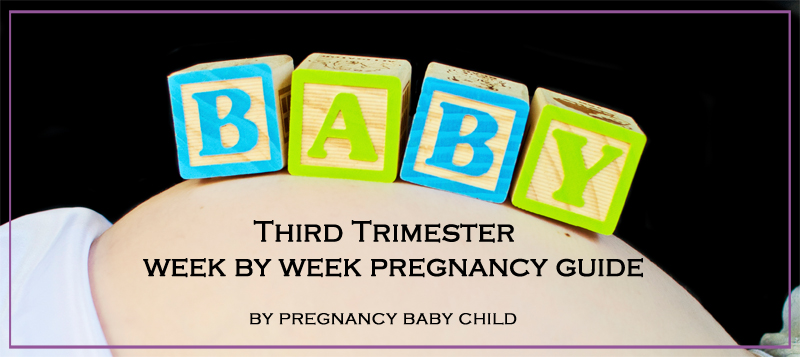Week 27 of Pregnancy – Congratulations, you are now on the home stretch of your pregnancy as you enter your first week of the third trimester! This last trimester can become quite frustrating, with some uncomfortable side effects. You may find that you have less energy in coming weeks. Another embarrassing problem that pregnant women face is light bladder leakage. Pelvic floor exercises can help with this common problem and should be continued after the birth of your baby to strengthen these muscles.
Week 28 of Pregnancy – From 28 weeks of pregnancy there is a huge list of discomforts that you may be facing, but remember that at the end of this trimester it will all be over and you will have a precious baby to show for your months of hard work. Your obstetrician visits may become much more regular from now on until the end of your pregnancy. Have you noticed your breasts leaking? This is colostrum, what your baby will drink the first few days before your milk comes in.
Week 29 of Pregnancy – Massage can help with back pain and leg cramps during the following weeks of pregnancy. Maintain correct posture to reduce back pain and also help with achieving the ideal orientation of your baby ready for labour. Your obstetrician will keep a close eye on the position of your baby from 29 weeks of pregnancy, as he/she drops lower into your pelvis in anticipation of birth.
Week 30 of Pregnancy – With only 10 weeks to go and your increasing size, getting rest is ever so important yet very difficult. Not only is your baby more active when you are still but the ever increasing need to visit the bathroom makes for sleepless nights. Swelling and fluid retention are common complaints towards the end of pregnancy. Elevate your feet when possible to help reduce swelling. Your baby’s lungs are now capable to breath air and you may even notice he/she get the hiccups while practicing breathing.
Week 31 of Pregnancy – Your baby may be moving less in the later stages of pregnancy due to lack of room. However you still should feel some movement. If you are concerned contact your midwife or OB for advice. Finishing simple tasks may find you out of breath from week 31 of pregnancy. By this stage your baby will most likely be upside down and preparing for birth.
Week 32 of Pregnancy – Having trouble sleeping due to your belly size and heartburn? Pillows to prop yourself up and support your tummy can help you to get the rest you need in these final weeks of pregnancy. Where possible catch up on lost sleep during the day, you need all the rest you can get before your baby arrives. If you feel like you are starting to waddle like a duck when you walk, don’t worry! From 32 weeks of pregnancy your body generates a hormone called relaxin that loosens up your pelvis ready to deliver your baby.
Week 33 of Pregnancy – Have you got your hospital bag packed and ready to go? Most hospitals expect you to pre-book, so ensure you have organised this if it is your chosen method for the birth of your baby. They will also advise you what you need to know for when contractions start and to come to hospital. Swelling is common in pregnancy, however you should monitor all swelling as some is normal and some can be a cause for concern. Find out more in the week 33 of pregnancy article.
Week 34 of Pregnancy – Braxton hicks will become more frequent as you reach the end of your pregnancy. Try not to worry about labour and the size of your baby, no matter what his/her size is your body is designed to give birth. There are many methods to help with labour when necessary. As your baby lowers into your pelvis the pressure on your chest will be relieved somewhat, however you may find that due to your baby resting on your bladder, bathroom visits are very frequent. Any bleeding you experience in the third trimester should be taken seriously, contact your medical provider immediately if you have vaginal bleeding.
Week 35 of Pregnancy – You are most likely seeing your obstetrician every week from now on to check yours and your baby’s progress. The placement of your baby is very important at this stage of pregnancy and will also be monitored. From 35 weeks of pregnancy you may experience what is known as “the bloody show,” read more about this in the 35 weeks article. Do your best to relax and unwind in the last 5 weeks of pregnancy, you will need all your energy for when your baby arrives.
Week 36 of Pregnancy – At the end of 36 weeks your pregnancy is considered full term, which is great news for your baby. From now you should prepare yourself for the birth of your baby. Becoming well informed about labour and your options will put your mind at ease. Taking a hospital tour and completing antenatal classes will also help. Make sure you have a car-seat installed to bring your precious bundle home safely.
Week 37 of Pregnancy – Week 37 of your pregnancy is full term and means you could go into labour at anytime. Make sure you have discussed your birthing plan with your support person as they will keep you level headed when going through the stages of labour. From this point on you may notice an increase in vaginal discharge as your body prepares for labour. It may be suggested by your obstetrician to take the group B strep test, learn more about it in the week 37 article.
Week 38 of Pregnancy – You are probably thinking about one thing, and that’s labour! Know what to expect: find out everything you need to know about the stages of labour in the week 38 article including the bloody show, your waters breaking, contractions and the three stages of labour.
Week 39 of Pregnancy – Not everything goes according to plan, in week 39 of pregnancy we discuss different emergency interventions that may be required during the birth of your baby. It is always best to be informed no matter what so you can make an educated decision if required.
Week 40 of Pregnancy – Congratulations! You have reached 40 weeks of pregnancy and if you haven’t had your baby you should expect his/her arrival at any time. Usually you will not be allowed to go past 42 weeks (2 weeks over due) and therefore labour will be induced. Find out more about this in our final article, week 40 of pregnancy. Know the difference between the baby blues and post natal depression to recognise if you have any of the symptoms following the birth of your baby.
No matter when your baby is born, pregnancy baby child wishes you all the best and a big congratulations on welcoming your little boy or girl into the world!












